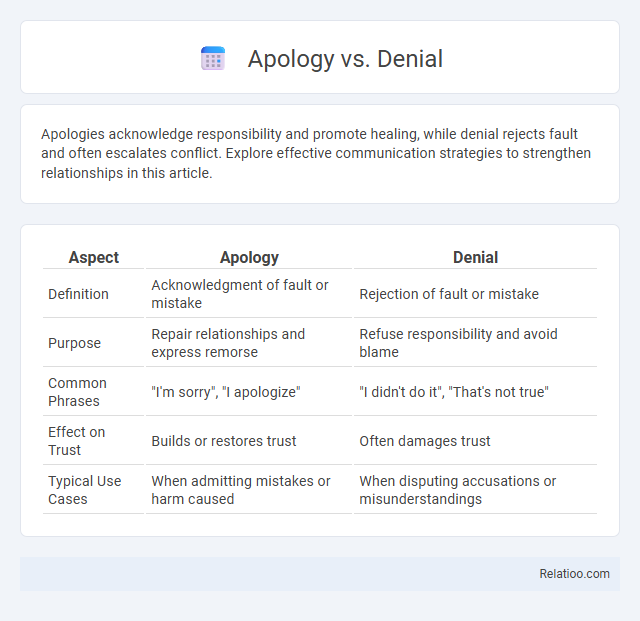Apologies acknowledge responsibility and promote healing, while denial rejects fault and often escalates conflict. Explore effective communication strategies to strengthen relationships in this article.
Table of Comparison
| Aspect | Apology | Denial |
|---|---|---|
| Definition | Acknowledgment of fault or mistake | Rejection of fault or mistake |
| Purpose | Repair relationships and express remorse | Refuse responsibility and avoid blame |
| Common Phrases | "I'm sorry", "I apologize" | "I didn't do it", "That's not true" |
| Effect on Trust | Builds or restores trust | Often damages trust |
| Typical Use Cases | When admitting mistakes or harm caused | When disputing accusations or misunderstandings |
Understanding Apology and Denial
Understanding apology involves recognizing an expression of regret and responsibility for a wrongdoing, which helps to restore trust and repair relationships. Denial, in contrast, is a refusal to acknowledge fault or wrongdoing, often leading to increased conflict and diminished communication. Your ability to distinguish between apology and denial is crucial for effective conflict resolution and emotional intelligence.
Psychological Foundations of Apology
Apologies engage core psychological processes such as empathy, guilt, and accountability, fostering conflict resolution and relationship repair by acknowledging harm and expressing remorse. Unlike denial, which psychologically serves as a defense mechanism to avoid responsibility, or offense, which reflects perceived threat or hurt, effective apologies actively promote social cohesion and trust restoration. Research highlights that sincere apologies reduce negative emotions and defensiveness, facilitating forgiveness and emotional healing.
The Mechanisms Behind Denial
Denial operates as a psychological defense mechanism where individuals refuse to acknowledge reality or facts, often to protect their self-esteem or avoid guilt. This involves cognitive distortion, selective attention, and rejection of evidence that contradicts one's beliefs or actions. Understanding denial requires exploring how neural networks process emotional threats, triggering avoidance behaviors that maintain psychological equilibrium.
Social Perceptions: Apology vs Denial
Apologies are often perceived as a sign of accountability and empathy, fostering trust and reconciliation in social interactions, while denials can trigger skepticism and damage credibility by appearing evasive or defensive. Social psychology research indicates that genuine apologies tend to repair relationships more effectively than denials, which may escalate conflict or reinforce negative judgments. The context and delivery of an apology versus a denial heavily influence public perception, with transparent acknowledgment of fault generally viewed more favorably than outright rejection of responsibility.
Effects on Personal Relationships
Apologies acknowledge wrongdoing and foster forgiveness, strengthening trust and emotional connection in personal relationships. Denial of issues often leads to unresolved conflicts and growing resentment, damaging communication and intimacy. Offense taken without resolution may escalate misunderstandings, creating emotional distance and weakening bonds between individuals.
Impact on Public Image and Reputation
Apology often restores public trust by demonstrating accountability and empathy, significantly improving reputation after a crisis. Denial can damage credibility if evidence contradicts claims, leading to skepticism and loss of public confidence. Offense taken by the public typically intensifies negative perceptions, exacerbating reputational harm and weakening stakeholder relationships.
Apology: Pathways to Resolution
Apology serves as a critical pathway to resolution by acknowledging wrongdoing and expressing sincere remorse, which fosters trust and healing in interpersonal conflicts. Unlike denial, which rejects responsibility, or offense, which may escalate tension, an effective apology facilitates empathy and opens communication channels for reconciliation. Research shows that genuine apologies reduce negative emotions and promote forgiveness, thereby accelerating conflict resolution and relationship repair.
Denial: Consequences and Risks
Denial involves rejecting responsibility or refusing to acknowledge an issue, which can lead to damaged trust and deteriorated relationships. Your persistence in denial often exacerbates conflicts, causing misunderstandings and prolonged disputes. Ignoring the consequences of denial risks alienating others and undermining potential resolutions.
When to Apologize vs. When to Deny
Apologize when accepting responsibility for a mistake or harm caused, showing empathy and commitment to repair the situation. Deny only when clear evidence disproves the accusation or when maintaining factual accuracy is essential to protect your integrity. Understanding the context and the impact on relationships guides whether to apologize or deny, balancing accountability with truthfulness.
Navigating Conflict: Best Practices
Navigating conflict requires understanding the differences between apology, denial, and offense to communicate effectively and repair relationships. Offering a sincere apology acknowledges harm and validates feelings, while denial dismisses responsibility, often escalating tension. You can foster resolution by actively listening, expressing empathy, and choosing your response based on the situation's emotional context.

Infographic: Apology vs Denial
 relatioo.com
relatioo.com